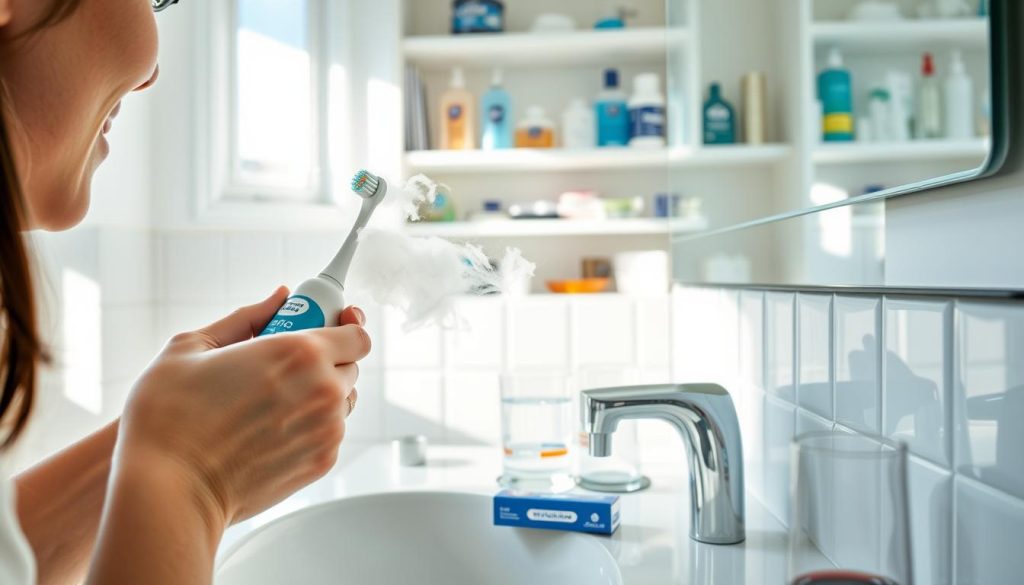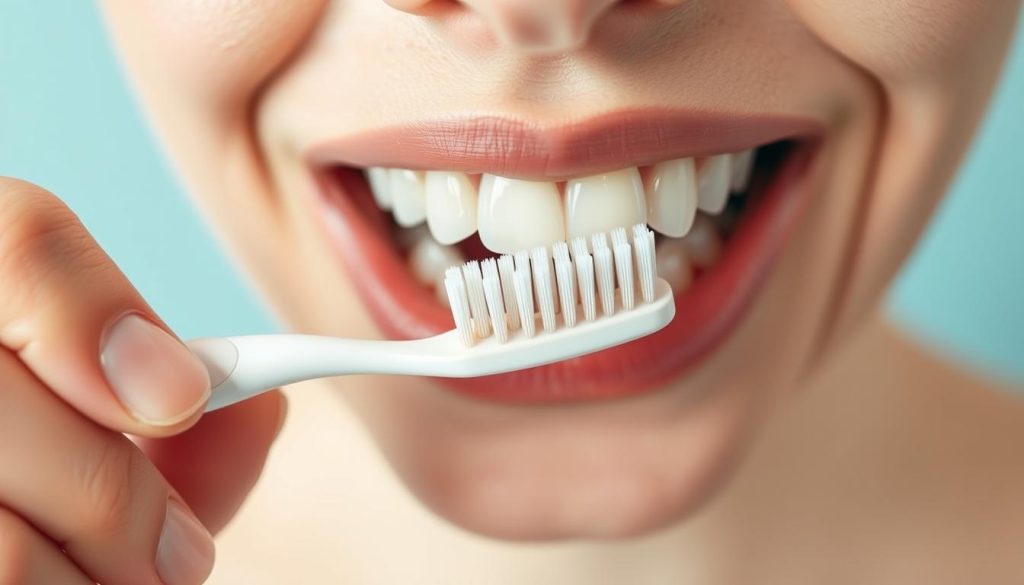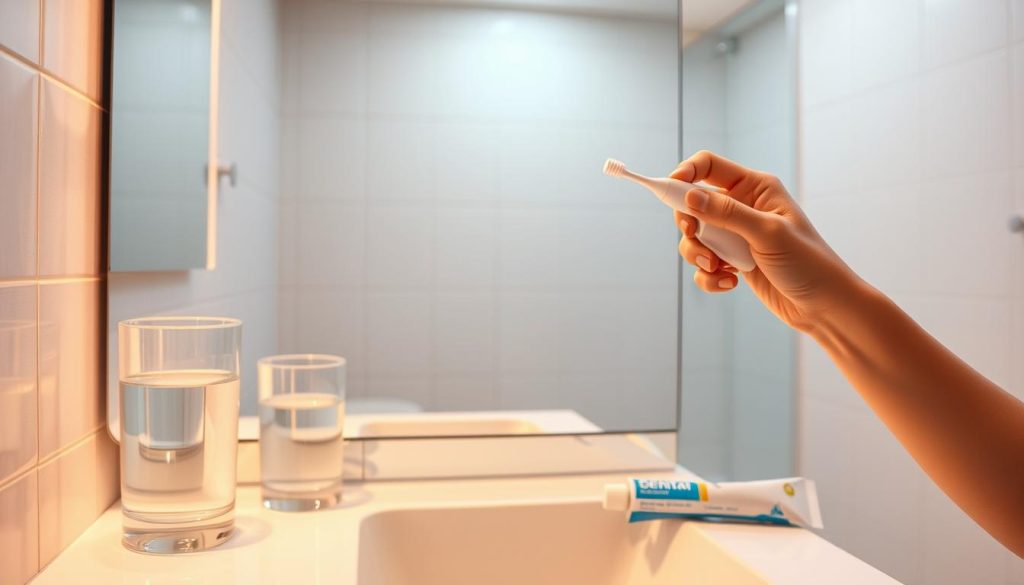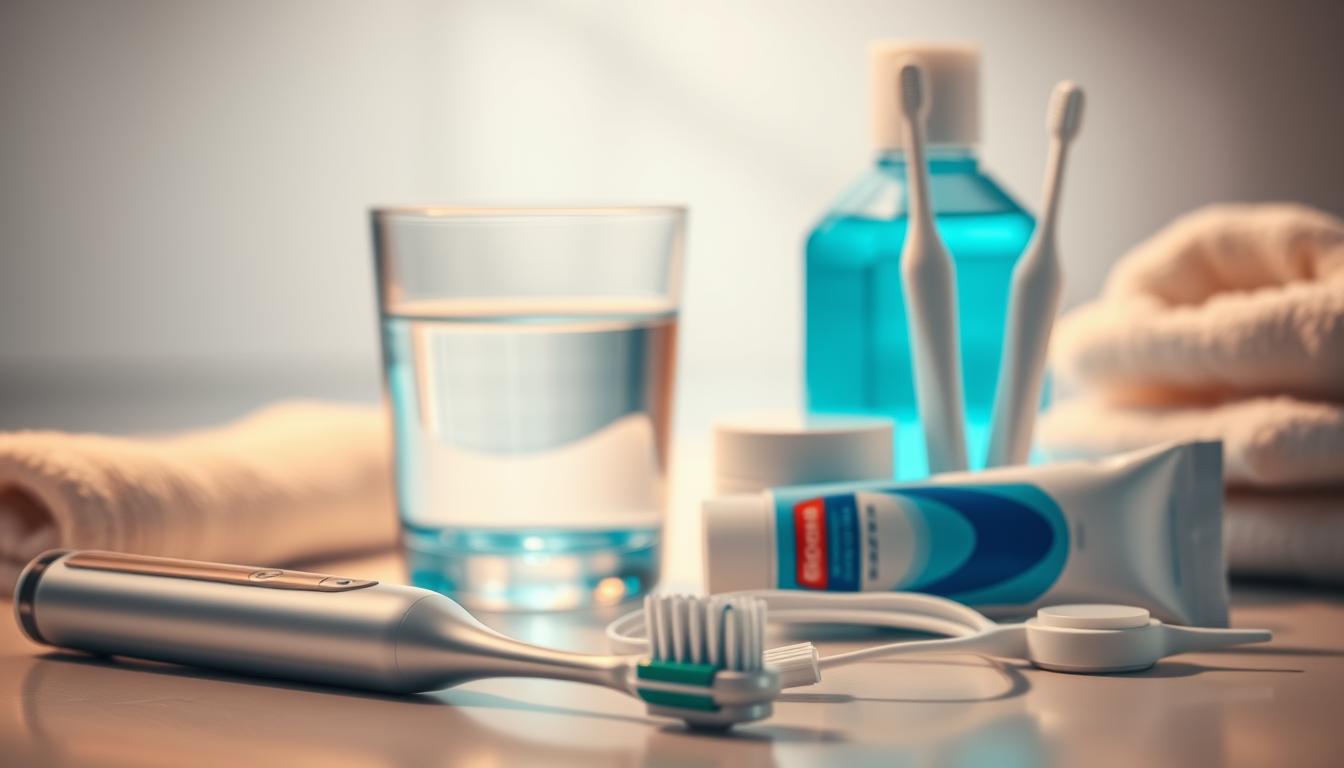Are you wondering if your current oral care routine is enough to keep your teeth and gums healthy for a lifetime?
Maintaining good oral health is crucial for a confident smile and overall well-being. Our comprehensive guide is designed to walk you through the best practices for a healthy mouth.
By following our daily hygiene guide, you’ll learn how to prevent common oral issues and ensure a lifetime of healthy teeth and gums.
Key Takeaways
- Understand the importance of a consistent oral care routine.
- Learn the best practices for maintaining healthy teeth and gums.
- Discover how to prevent common oral health issues.
- Get tips on how to incorporate oral hygiene into your daily routine.
- Find out how a healthy smile can boost your confidence.
The Importance of Consistent Oral Hygiene
The significance of regular oral hygiene cannot be overstated, as it impacts not just your teeth but your entire health. Consistent oral hygiene is vital for maintaining overall wellness, and its importance extends beyond just having a healthy smile.
How Oral Health Affects Overall Wellness
Oral health is closely linked to overall wellness. Research has shown that there is a significant connection between oral hygiene habits and various systemic diseases, including heart disease and diabetes. Poor oral health can lead to inflammation and infection, which can have far-reaching consequences for the body.
“The mouth is a window into the body’s overall health,” as many dental professionals emphasize. For instance, studies have found that individuals with periodontal disease are at a higher risk of developing cardiovascular disease. Moreover, maintaining good dental health tips can help prevent these issues.
The Cost of Neglecting Your Dental Care
Neglecting your dental care can lead to a range of problems, from cavities and gum disease to more severe conditions like tooth loss and oral cancer. The financial cost of neglecting oral hygiene practices can also be significant, as treating advanced dental issues is often more expensive than preventive care.
Furthermore, practicing good brushing techniques is fundamental to oral hygiene. Proper brushing helps remove plaque, prevent tartar buildup, and reduce the risk of dental problems. It’s essential to brush your teeth at least twice a day, in the morning and before bed, using a fluoride toothpaste and a soft-bristled toothbrush.
By understanding the importance of consistent oral hygiene and adopting good habits, you can significantly improve your oral health and overall well-being.
Your Complete Daily Oral Hygiene Guide
To achieve optimal oral health, it’s essential to follow a consistent daily hygiene guide. A well-structured daily oral hygiene routine can help prevent common oral health issues such as cavities and gum disease.
Understanding the Basics of Oral Care
Oral care involves more than just brushing your teeth. It includes a combination of proper brushing techniques, flossing, and mouthwash usage. Understanding these basics is crucial for maintaining good oral hygiene.
The oral care routine should be tailored to your specific needs, taking into account factors such as age, dietary habits, and existing oral health conditions.

Creating a Sustainable Routine
Creating a sustainable oral hygiene routine involves setting realistic goals and incorporating dental hygiene steps into your daily schedule. It’s about making oral care a habit.
To make your routine sustainable, consider the following tips:
- Start with small, achievable changes.
- Be consistent with your oral care practices.
- Monitor your progress and adjust your routine as needed.
Tracking Your Oral Health Progress
Tracking your oral health progress is vital for identifying areas that need improvement. Regular dental check-ups can provide valuable insights into your oral health status.
Additionally, keeping a record of your oral hygiene practices can help you stay motivated and committed to your routine. This can be done using a simple log or a mobile app designed for tracking oral health.
Essential Tools for Effective Dental Care
Effective dental care starts with understanding the essential tools you need. Having the right equipment can make a significant difference in your oral hygiene routine.
Choosing the Right Toothbrush
Selecting the appropriate toothbrush is crucial for effective dental care. The choice between manual and electric toothbrushes depends on personal preference and oral health needs.
Manual vs. Electric Options
Manual toothbrushes are cost-effective and widely available, while electric toothbrushes offer advanced features like timers and pressure sensors.
- Manual toothbrushes are good for those who prefer a simple, low-cost option.
- Electric toothbrushes are ideal for individuals with limited dexterity or those who want a more thorough clean.
Bristle Types and Their Benefits
The type of bristles on your toothbrush can significantly impact your oral health.
- Soft bristles are gentle on gums and suitable for most users.
- Medium bristles offer a balance between cleaning effectiveness and gentleness.
- Hard bristles can be too abrasive and are generally not recommended.
Toothpaste Selection Guide
Choosing the right toothpaste is vital for addressing specific oral health needs.
| Toothpaste Type | Benefits |
|---|---|
| Fluoride toothpaste | Strengthens tooth enamel and prevents decay |
| Whitening toothpaste | Helps remove surface stains and brighten teeth |
| Sensitive toothpaste | Desensitizes nerves and reduces sensitivity |
Flossing Tools and Alternatives
Flossing is an essential part of oral hygiene, and there are various tools available to make it easier.
- Traditional floss is effective for removing plaque and food particles.
- Floss picks offer a convenient alternative for those who struggle with traditional floss.
- Interdental brushes are useful for cleaning between teeth and around dental work.
By choosing the right tools for your oral care routine, you can maintain good oral hygiene and prevent common dental issues.
Morning Oral Care Routine: Step by Step
Starting your day with a consistent morning oral care routine is essential for maintaining good oral hygiene. A well-structured routine helps remove plaque, bacteria, and morning breath, setting you up for a healthy day.
Proper Brushing Techniques
Brushing your teeth is the foundation of any oral care routine. To do it effectively, you need to understand the proper techniques.
The 2-Minute Rule
The American Dental Association recommends brushing your teeth for at least 2 minutes, twice a day. To make this more manageable, you can divide your mouth into four sections: top left, top right, bottom left, and bottom right. Spend 30 seconds on each section to ensure a thorough clean.
Reaching All Surfaces
It’s crucial to brush all surfaces of your teeth, including the front, back, and top. Use gentle circular motions and make sure to brush along the gum line. Pay special attention to areas where your teeth and gums meet, as this is a common place for plaque to accumulate.

Effective Flossing Methods
Flossing is an essential part of your oral care routine, as it removes food particles and plaque from between your teeth and under your gum line. To floss effectively:
- Take a piece of floss and wrap it around your middle fingers, leaving about 1-2 inches of floss in between.
- Gently slide the floss between your teeth, curving it around the edge of each tooth in a “C” shape.
- Move the floss up and down against the tooth and under the gum line.
Mouthwash Usage Tips
Using mouthwash can provide an additional layer of protection against plaque, gingivitis, and bad breath. Here are some tips for using mouthwash effectively:
- Choose a mouthwash that has the ADA Seal of Acceptance, indicating it meets dental standards.
- Swish the mouthwash around your mouth for 30 seconds to 1 minute, making sure to reach all areas.
- Do not swallow mouthwash, and avoid rinsing your mouth with water immediately after use.
By following this step-by-step morning oral care routine, you can maintain good oral hygiene and prevent common oral health issues. Remember, consistency is key to a healthy smile.
Evening Dental Care Practices
As the day comes to a close, it’s essential to prioritize your oral health with a consistent evening dental care routine. This nightly regimen helps remove the day’s accumulation of plaque, bacteria, and food particles, setting the stage for a healthy smile.
Why Nighttime Oral Care Matters
Nighttime oral care is crucial because it helps prevent the buildup of plaque and bacteria that can lead to cavities and gum disease. “Neglecting your oral hygiene routine before bed can have serious consequences for your dental health,” says a leading dental expert. By cleaning your teeth thoroughly before bed, you significantly reduce the risk of oral health issues.
Thorough Cleaning Before Bed
To clean your teeth effectively before bed, follow these dental hygiene steps:
- Brush your teeth for at least two minutes using a fluoride toothpaste.
- Pay special attention to the areas where your teeth and gums meet.
- Floss to remove any food particles and plaque from between your teeth.
- Consider using an antibacterial mouthwash to further reduce bacteria.
Additional Nighttime Considerations
Beyond brushing and flossing, there are other factors to consider for optimal oral health at night.
Grinding and Teeth Protection
If you grind your teeth at night, consider using a mouthguard to protect your teeth from damage. Teeth grinding, or bruxism, can lead to worn enamel, chipped teeth, and jaw pain. A custom-fitted mouthguard can help alleviate these issues.
Hydration and Oral Health
Staying hydrated is also important for oral health. Drinking water throughout the day and before bed helps to keep your mouth moist and wash away bacteria. As the American Dental Association notes, “good oral health is closely tied to overall health and hydration plays a key role.”
“The key to a healthy smile is consistent oral hygiene practices, including a thorough nighttime routine.”
By incorporating these oral health tips into your evening routine, you’ll be well on your way to maintaining a healthy, happy smile.
Between-Meals Oral Hygiene Habits
Between-meal oral care is essential for preventing common oral health issues. Maintaining a consistent oral hygiene routine, even between meals, can significantly impact your overall dental health. In this section, we’ll explore the importance of quick cleaning after eating, provide tips on tooth-friendly snacks and beverages, and discuss on-the-go oral care solutions.
Quick Cleaning After Eating
Quick cleaning after meals and snacks can help remove food particles and reduce the risk of plaque buildup. One effective method is to rinse your mouth with water or mouthwash. Mouthwash benefits include killing bacteria and freshening breath. For a more thorough clean, consider using interdental brushes or floss picks designed for on-the-go use.
Here’s a simple guide to quick cleaning after eating:
- Rinse with water or mouthwash
- Use interdental brushes or floss picks
- Choose sugar-free gum to stimulate saliva production
Tooth-Friendly Snacks and Beverages
Choosing the right snacks and beverages can significantly impact your oral health. Opt for tooth-friendly snacks like raw vegetables, fruits, and cheese, which can help neutralize acids and stimulate saliva production. Avoid sugary and acidic foods and drinks that can lead to tooth decay.
| Tooth-Friendly Snacks | Snacks to Avoid |
|---|---|
| Raw vegetables | Sugary candies |
| Fruits | Acidic fruits like lemons |
| Cheese | Chips and crackers |
On-the-Go Oral Care Solutions
For those with busy lifestyles, on-the-go oral care solutions are a must. Consider carrying a travel-sized oral care kit that includes a toothbrush, toothpaste, and floss.

Portable mouthwashes and sugar-free gum can also be convenient additions to your daily routine.
By incorporating these between-meal oral hygiene habits into your daily routine, you can maintain a healthy smile and prevent common oral health issues. Remember, a consistent oral care routine is key to long-term oral health.
Common Oral Hygiene Mistakes to Avoid
Many individuals are unaware of the simple yet detrimental mistakes they make in their daily oral hygiene practices. Being mindful of these errors can significantly improve one’s dental health.
Brushing Errors That Damage Teeth
Brushing your teeth is the cornerstone of oral hygiene, but doing it incorrectly can lead to more harm than good. Using too much force or brushing too frequently can damage the enamel on your teeth, making them more susceptible to decay.
- Brushing too hard
- Not brushing for the full recommended 2 minutes
- Using a toothbrush with hard bristles
Flossing Misconceptions
Flossing is another critical aspect of oral hygiene, but many people do it incorrectly. A common misconception is that flossing is only necessary if you have food stuck between your teeth. In reality, flossing helps remove plaque that can lead to gingivitis and other gum diseases.
- Flossing too roughly, causing gum bleeding
- Not curving the floss around the tooth
- Flossing too infrequently
Overlooked Aspects of Oral Care
Beyond brushing and flossing, there are other aspects of oral care that are often overlooked. Paying attention to these can enhance your overall oral hygiene.
Tongue Cleaning Importance
Cleaning your tongue is crucial for removing bacteria that can cause bad breath and other oral health issues. Incorporating a tongue scraper into your routine can make a significant difference.
Replacing Dental Tools Regularly
Dental tools, such as toothbrushes and floss, need to be replaced regularly. Using old or worn-out tools can be ineffective and even harmful.
| Tool | Recommended Replacement Time |
|---|---|
| Toothbrush | Every 3-4 months |
| Floss | As needed, check for wear |
| Tongue Scraper | Every 6-12 months |
Professional Cleanings Schedule
Regular professional cleanings are vital for maintaining good oral health. Scheduling cleanings every six months can help prevent a range of oral health issues.
Conclusion: Building Lifelong Oral Health Habits
Developing a consistent daily oral hygiene guide is crucial for maintaining optimal oral health. By incorporating good oral hygiene habits into your daily routine, you can prevent common dental issues and ensure a healthy, confident smile.
Following the best practices for oral hygiene outlined in this guide, you can create a personalized oral care routine that suits your needs. This includes understanding the importance of proper brushing techniques, effective flossing methods, and the role of mouthwash in your oral hygiene regimen.
By committing to these oral health tips and making them a part of your daily life, you can enjoy long-term benefits, including a reduced risk of dental problems and a brighter, healthier smile. Stay dedicated to your oral hygiene habits, and you’ll be on your way to a lifetime of good oral health.

Leave a Reply